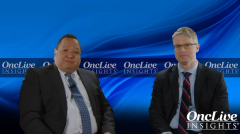
Unmet Needs and Future Directions in the Management of CIM
Martin Dietrich, MD, PhD, and Edgardo Santos, MD, FACP, offer closing remarks on unmet needs and future directions in the management of CIM including other disease states where trilaciclib may offer myeloprotective benefit.
Episodes in this series

Transcript:
Martin Dietrich, MD, PhD: What are the remaining unmet needs in myeloprotection? Especially in small cell lung cancer, but maybe even a bigger context.
Edgardo Santos, MD, FACP: Martin, as I said before, I would like to see this myeloprotectant agent move forward in other indications, not only small cell lung cancer. As you mentioned, there are so many regimens that we need to investigate. There are some clinical trials using trilaciclib in the space of metastatic colorectal cancer, which we use. For example, a combination of FOLFOX [folinic acid, fluorouracil, oxaliplatin]plus bevacizumab is used. In fact, I just started a patient on this regimen last week in my clinic. There are studies using trilaciclib in this specific scenario because we know that FOLFOXI plus bevacizumab will cause myelosuppression in the patient. Remember, this therapy is every 2 weeks. We need to keep those progenitor cells as intact as we can. There are some other studies done on breast cancer, triple-negative breast cancer, in which, unfortunately, the female patient with triple-negative breast cancer must go to systemic chemotherapy. Chemotherapy is sometimes myelosuppressive, especially when we use a regimen that cannot cause neutropenia but can cause thrombocytopenia. As I mentioned before, trilaciclib, this myeloprotectant, covers all lineage. It’s not only the progenitor for the white blood cells and the neutrophils, but also in the red blood cell lineage and the megakaryocyte for the platelets.
Martin Dietrich, MD, PhD: We’re seeing the timing of platelet and white blood cell destruction and lack of recovery much earlier than in red blood cells. They can both be equally dangerous in their own right. You mentioned triple-negative breast cancer. Are you seeing any other strategies that are on the horizon? Are there any disease spaces where you think this would be an interesting area?
Edgardo Santos, MD, FACP: I would say that there are many myelosuppressive regimens, but the sarcoma ones are what I’m really interested in because these regimens are very myelotoxic. I think that we need to investigate those areas. This is also in the GU [genitourinary] space, the same thing. We have some chemotherapy regimens that involve 2, 3, or 4 drugs. I think that we need to investigate that as well.
Martin Dietrich, MD, PhD: I think we’re seeing the concern. Whether or not we are experiencing the same outcomes, we don’t necessarily have retinoblastoma pathway impairments that may protect from CDK6 [cyclin-dependent kinase 6] impact. I think this may be an opportunity for a genomic guidance situation where we can do this tumor by tumor, as we’re sequencing more of the tumors. Again, small cell lung cancer is one of the few biogenic defined tumor types with TP53 and RB dual mutations.
Edgardo Santos, MD, FACP: Absolutely. I completely agree.
Martin Dietrich, MD, PhD: Thank you, Dr Santos, for a wonderful discussion. Thank you to you for your insightful comments and thank you to our audience for listening to us today.
Edgardo Santos, MD, FACP: Dr Dietrich, it’s always a pleasure to share this forum with you. I’m looking forward to seeing you another time. It’s important what we are doing. We are providing our cancer patients with new hope so they know there is something more to deliver than just therapy. We are also watching them, to protect them from side effects of therapy. I think it is very important what we are doing. Thank you once again for having us.
Transcript edited for clarity.
Newsletter
Knowledge is power. Don’t miss the most recent breakthroughs in cancer care.

























































































